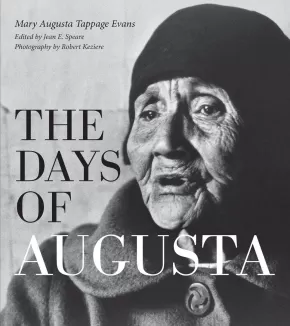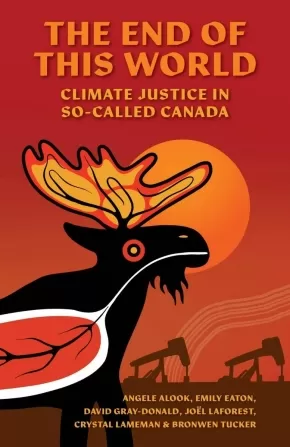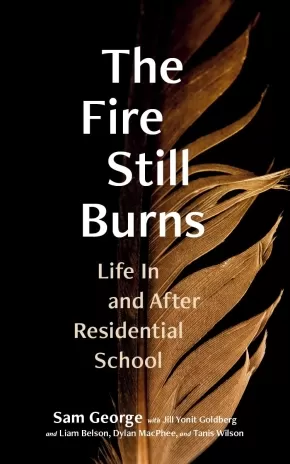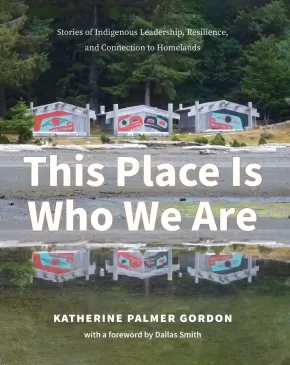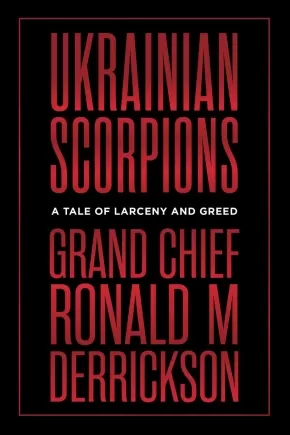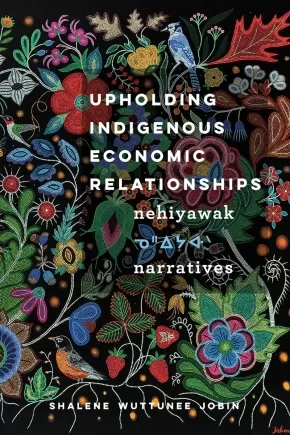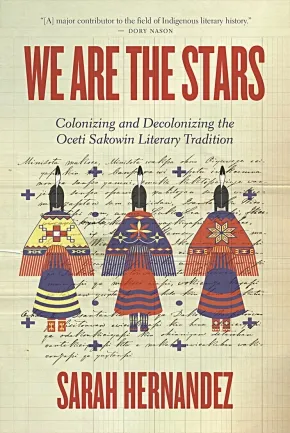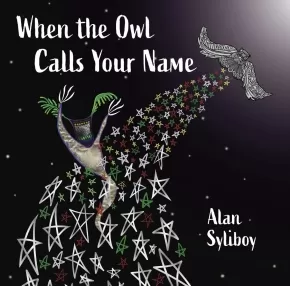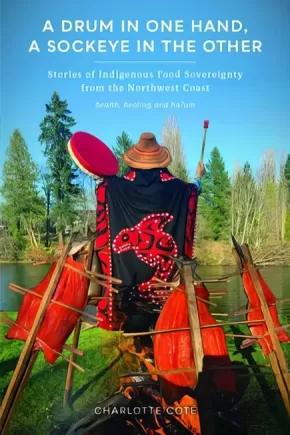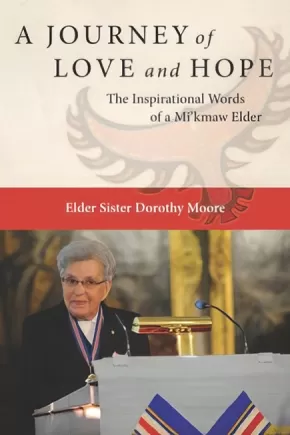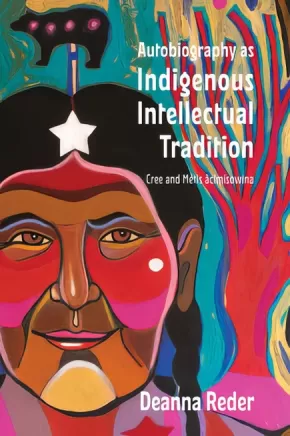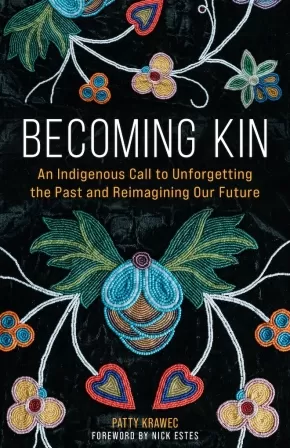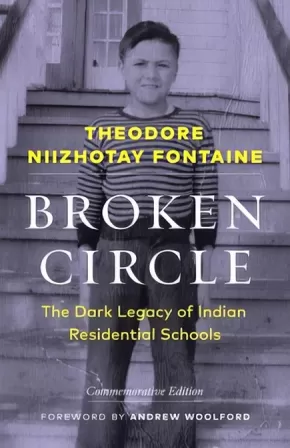
First Nations
106
-
120
of
331 Results;
Sort By
Go To
of 23
The Days of Augusta
$24.95
Artists:
Editors:
Format:
Paperback
Text Content Territories:
Indigenous Canadian; First Nations; Salish; Interior Salish; Secwepemc (Shuswap);
Reading Level: N/A
ISBN / Barcode: 9781990776489
Synopsis:
Synopsis:
Hailed as a contemporary classic of oral literature, The Days of Augusta is Shuswap elder Augusta Evans’ memories of a lifetime that spanned from 1888 to 1978.
Accompanied by Robert Keziere’s intimate photographs, Augusta’s rhythmic prose reads like poetry. She depicts with strength and eloquence her own story—her days at the Mission School, making baskets and catching salmon, the pain of giving birth and the death of a son—as well as the legends and stories of events told to her—a stagecoach robbery, a woman who was the prisoner of a bear. First printed in 1973, Augusta’s story continues to be a fascinating glimpse into the past, with throughlines to the present.
Additional Information
80 pages | 8.00" x 9.00"| 25 b&w photos | Paperback
The End of This World: Climate Justice in So-Called Canada
$25.95
Format:
Paperback
Text Content Territories:
Indigenous Canadian;
Reading Level: N/A
ISBN / Barcode: 9781771136129
Synopsis:
Synopsis:
The climate crisis is here, and the end of this world—a world built on land theft, resource extraction, and colonial genocide—is on the horizon. In this compelling roadmap to a livable future, Indigenous sovereignty and climate justice go hand in hand.
Drawing on their work in Indigenous activism, the labour movement, youth climate campaigns, community-engaged scholarship, and independent journalism, the six authors challenge toothless proposals and false solutions to show that a just transition from fossil fuels cannot succeed without the dismantling of settler capitalism in Canada. Together, they envision a near future where oil and gas stay in the ground; where a caring economy provides social supports for all; where wealth is redistributed from the bloated billionaire class; and where stolen land is rightfully reclaimed under the jurisdiction and sovereignty of Indigenous peoples.
Packed with clear-eyed analysis of both short- and long-term strategies for radical social change, The End of This World promises that the next world is within reach and worth fighting for.
Reviews
“The End of This World gifts readers with a mapping of a communal future grounded in Indigneous concepts of caring, relationship, solidarity, and a sharp analysis of the present. It is a gathering space, an experiment, and an invitation towards building formations of life outside of the cage of colonialism and capitalism. Engaging, timely, and crucial, I am so grateful this book exists, and for the futures it will inspire."— Leanne Betasamosake Simpson, co-author of “Rehearsals for Living”
"This book is a major and much-needed contribution to the climate conversation in Canada. The collective behind it embodies the very politics necessary to win a just transition that is worthy of the name: Indigenous-led, internationalist, rooted in solidarity, and crackling with moral clarity. The End of This World advances a holistic, radically reasonable vision of a future worth fighting for—and the authors have tallied the receipts for that glorious moment when the perpetrators of planetary arson get served the bill.”— Avi Lewis, co-author of “The Leap Manifesto”
Additional Information
240 pages | 5.50" x 8.50" | Paperback
The Fire Still Burns: Life In and After Residential School
$21.95
Format:
Paperback
Text Content Territories:
Indigenous Canadian; First Nations; Salish; Coast Salish; Squamish;
Reading Level: N/A
ISBN / Barcode: 9780774880855
Synopsis:
Synopsis:
“My name is Sam George. In spite of everything that happened to me, by the grace of the Creator, I have lived to be an Elder.”
The crimes carried out at St. Paul’s Indian Residential School in North Vancouver scarred untold numbers of Indigenous children and families across generations. Sam George was one of these children. This candid account follows Sam from his idyllic childhood growing up on the Eslhá7an (Mission) reserve to St. Paul’s, where he weathered physical, emotional, and sexual abuse. He spent much of his life navigating the effects of this trauma – prison, addiction, and challenging relationships – until he found the strength to face his past. Now an Elder and educator with the Indian Residential School Survivors Society, this is Sam’s harrowing story, in his own words. An ember of Sam’s spirit always burned within him, and even in the darkest of places he retained his humour and dignity.
The Fire Still Burns is an unflinching look at the horrors of a childhood in the Indian Residential School system and the long-term effects on survivors. It illustrates the healing power of one’s culture and the resilience that allows an individual to rebuild a life and a future.
This frank and powerful personal story of trauma and resilience will bring a greater understanding to all readers – Indigenous and non-Indigenous alike – of residential schools and the impact they had on those who were forced to attend them.
Reviews
"I am glad that Sam George has lent his voice to the many voices of survivors now surfacing from residential "schools". I love the way Sam describes his traditional life before he was forced to go to the school and then later goes back to his culture to overcome the trauma he endured. Sam did time in jail for a crime he committed, but the real crime is that our Indigenous way of life was interfered with, and that created the dysfunction in our communities. This book shows that we had it right all along – Indigenous culture is our saviour."— Bev Sellars, author of They Called Me Number One: Secrets and Survival at an Indian Residential School
"Brutally frank yet disarmingly subtle, sensitive, and funny, The Fire Still Burns by Sam George offers an unflinching look at the human dimensions of Canada’s attempted genocide of Indigenous Peoples through residential schooling." — Sam McKegney, author of Carrying the Burden of Peace: Reimagining Indigenous Masculinities through Story
Educator Information
Table of Contents
Preface / Sam George
Acknowledgments
A Note on the Text
1 Your Name Is T'seatsultux
2 In Them Days
3 Our Lives Signed Away
4 The Strap
5 A Girl Named Pearl, a Boy Named Charlie
6 Runaway
7 I Tried to Be Invisible
8 Finding Ways to Feel Good
9 On Our Own
10 Oakalla
11 Haney Correctional
12 Longshoreman
13 Misery Loves Company
14 Drowning
15 Tsow-Tun Le Lum
16 I’m Still Here
Afterword: On Co-Writing Sam George’s Memoir / Jill Yonit Goldberg
Reader’s Guide
About the Authors
Additional Information
152 pages | 5.00" x 8.00" | Paperback
This Place Is Who We Are: Stories of Indigenous Leadership, Resilience, and Connection to Homelands
$39.95
Format:
Paperback
Text Content Territories:
Indigenous Canadian; First Nations; Kwakwaka'wakw (Kwakiutl); Ligwilda'wx (Laich-kwil-tach); Wei Wai Kai Nation; Dzwada’enuxw; Haida; Nuxalk (Bella Coola);
Reading Level: N/A
ISBN / Barcode: 9781990776137
Synopsis:
Synopsis:
This Place Is Who We Are profiles Indigenous communities in central and northern coastal BC that are reconnecting to their lands and waters—and growing and thriving through this reconnection.
Indigenous peoples and cultures are integrally connected to the land. Well-being in every sense—physical, social, environmental, economic, spiritual and cultural—depends on that relationship, which is based on a fundamental concept: when the land is well, so are the people.
With increasing strength, Indigenous peoples in this vast region of BC—which spans the homelands of more than two dozen First Nations and one of the largest remaining coastal temperate rainforests in the world—are restoring what has been lost through environmental depredation and healing what has been devastated by colonization.
This volume is a collection of ten of these inspiring stories. X̱aayda voices explain how their Rediscovery camps are healing and empowering their youth; Dzawada̱’enuxw Hereditary Chief Maxwiyalidizi K’odi Nelson shares the story of building a healing centre and ecolodge; Wei Wai Kum Chief Christopher Roberts describes the challenges and opportunities for an urban First Nation looking to prosper while protecting the environment and ancient Ligʷiłdaxʷ history and living cultural values; and many more Indigenous leaders share their own experiences of growth, strength and reconnection.
Thoughtful and inspiring, This Place Is Who We Are illustrates what can be accomplished when conservation and stewardship are inextricably intertwined with the prosperity and well-being of communities.
Reviews
“Katherine Palmer Gordon, a consummate listener, weaves a powerful tapestry of ten First Nations people, deeply grounded in land, memory and story. Their lives honour the inextinguishable inter-connectedness of humans and nature, in righteous defiance of colonization. These are stories that point to an optimistic future based on the teachings of Ancestors and Elders with a view to making the world better for children, grandchildren and children yet to come. To do this, human wellbeing and land protection must be inseparable. This book is an encounter with wonderful people doing wonderful things. This Place is Who We Are is an invitation to hope for a better society, a better world, featuring ten people creating it. I thank the contributors and Katherine Palmer Gordon for engaging in a visionary conversation.” — Shelagh Rogers, O.C. Host/Producer of The Next Chapter, CBC Radio One, Honorary Witness, Trut
“A beautiful collection of stories and lived experiences! Each with gentle and loving reminders of our sacred connections to each other, the land and water and all living beings. Individually, these stories are inspiring, hopeful and thought provoking. As a collection, majestically woven together by Katherine Palmer Gordon, they have the potential to change hearts and minds of readers, decision makers and future generations.” — Monique Gray Smith
“An astute facilitator of Indigenous governmental relationships and reconciliation, Katherine Palmer Gordon is also an award-winning writer, and a very good listener who earns trust. These deeply personal accounts of Indigenous cultural rediscovery, empowerment—and healing in a post-colonial world—are truly inspiring. Steeped in ancient connections with the land, the shared wisdom and vision of elders, youth and community leaders offer timely lessons for a healthier, more respectful relationship between people, wildlife and our planet. This is good medicine for all.” — Mark Forsythe, Co-author of The Trail of 1858: British Columbia's Gold Rush Past and former C
“Katherine Palmer Gordon, a consummate listener, weaves a powerful tapestry of ten First Nations people, deeply grounded in land, memory and story. Their lives honour the inextinguishable inter-connectedness of humans and nature, in righteous defiance of colonization. These are stories that point to an optimistic future based on the teachings of Ancestors and Elders with a view to making the world better for children, grandchildren and children yet to come. To do this, human wellbeing and land protection must be inseparable. This book is an encounter with wonderful people doing wonderful things. This Place is Who We Are is an invitation to hope for a better society, a better world, featuring ten people creating it. I thank the contributors and Katherine Palmer Gordon for engaging in a visionary conversation.” — Shelagh Rogers, O.C. Host/Producer of The Next Chapter, CBC Radio One, Honorary Witness, Trut
“A beautiful collection of stories and lived experiences! Each with gentle and loving reminders of our sacred connections to each other, the land and water and all living beings. Individually, these stories are inspiring, hopeful and thought provoking. As a collection, majestically woven together by Katherine Palmer Gordon, they have the potential to change hearts and minds of readers, decision makers and future generations.” — Monique Gray Smith
“An astute facilitator of Indigenous governmental relationships and reconciliation, Katherine Palmer Gordon is also an award-winning writer, and a very good listener who earns trust. These deeply personal accounts of Indigenous cultural rediscovery, empowerment—and healing in a post-colonial world—are truly inspiring. Steeped in ancient connections with the land, the shared wisdom and vision of elders, youth and community leaders offer timely lessons for a healthier, more respectful relationship between people, wildlife and our planet. This is good medicine for all.” — Mark Forsythe, Co-author of The Trail of 1858: British Columbia's Gold Rush Past and former C
Additional Information
256 pages | 8.00" x 10.00" | Paperback
256 pages | 8.00" x 10.00" | Paperback
Ukrainian Scorpions: A Tale of Larceny and Greed
$28.95
Format:
Paperback
Text Content Territories:
Indigenous Canadian; First Nations; Salish; Interior Salish; Syilx (Okanagan); Westbank First Nation;
Reading Level: N/A
ISBN / Barcode: 9781770415676
Synopsis:
Synopsis:
Award-winning author Grand Chief Ron Derrickson tells the story of his personal fight against Ukrainian political and economic forces alongside the larger story of the wider struggle for Ukraine to end the corruption that has plagued the country since the 1990s
Ron Derrickson watched the Russian invasion of Ukraine, the country where he had spent much of the past 20 years, with a kind of anguish, knowing the country had been systematically shut out of the EU and left on its own. While doing business there, he had entered the rabbit hole of Ukrainian political and economic life, a land where gangsters controlled not only the heights of the economy but also the police, the courts, and the national parliament. At stake was his $28 million company stolen by a cast of characters that included a former governor and members of the national parliament.
In the end, Derrickson spent a dozen years fighting for justice in the courts, in political and diplomatic spheres, and even with automatic weapon-toting mercenaries. Ukranian Scorpions tells not only the story of his personal battles but the much wider struggle of Ukraine to find its footing and shake off the gangsterism that has plagued it since the 1990s. In the end, Derrickson searches for signs that after the recent cataclysm, a new Ukraine might rise from the ashes.
Additional Information
232 pages | 6.00" x 9.00" | Paperback
Upholding Indigenous Economic Relationships: Nehiyawak Narratives
$34.95
Format:
Paperback
Text Content Territories:
Indigenous Canadian; First Nations; Cree (Nehiyawak); Métis;
Reading Level: N/A
ISBN / Barcode: 9780774865203
Synopsis:
Synopsis:
Upholding Indigenous Economic Relationships explains settler colonialism through the lens of economic exploitation, using Indigenous methodologies and critical approaches. What is the relationship between economic progress in the land now called Canada and the exploitation of Indigenous peoples? And what gifts embedded within Indigenous world views speak to miyo‐pimâtisiwin ᒥᔪ ᐱᒫᑎᓯᐃᐧᐣ (the good life), and specifically to good economic relations?
Shalene Wuttunee Jobin draws on the knowledge systems of the nehiyawak ᓀᐦᐃᔭᐊᐧᐠ (Cree people) – whose distinctive principles and practices shape their economic behaviour – to make two central arguments. The first is that economic exploitation was the initial and most enduring relationship between newcomers and Indigenous peoples. The second is that Indigenous economic relationships are constitutive: connections to the land, water, and other human and nonhuman beings form who we are as individuals and as peoples. This groundbreaking study employs Cree narratives that draw from the past and move into the present to reveal previously overlooked Indigenous economic theories and relationships, and provides contemporary examples of nehiyawak renewing these relationships in resurgent ways. In the process, Upholding Indigenous Economic Relationships offers tools that enable us to reimagine how we can aspire to the good life with all our relations.
This study will interest not only scholars and students of Indigenous studies, particularly Cree studies, but also Indigenous community members involved in community and economic development, planning, and governance.
Reviews
"Beautifully written, Upholding Indigenous Economic Relationships is crucially important as a comprehensive exploration of Cree economic values told through story and oral history." -
"Shalene Jobin’s refreshing perspective on a prairie First Nations community is a desperately needed contribution to Indigenous studies as well as history, anthropology, and Canadian studies." -
Educator Information
Table of Contents
Preface
1 Grounding Methods
2 Grounding Economic Relationships
3 nehiyawak Peoplehood and Relationality
4 Canada’s Genesis Story
5 ᐃᐧᐦᑎᑯᐤ Warnings of Insatiable Greed
6 Indigenous Women’s Lands and Bodies
7 Theorizing Cree Economic and Governing Relationships
8 Colonial Dissonance
9 Principles Guiding Cree Economic Relationships
10 Renewed Relationships through Resurgent Practices
11 Upholding Relations
Postscript
Glossary of Cree Terms
Notes; References; Index
Additional Information
272 pages | 6 x 9" | Paperback
We Are the Stars: Colonizing and Decolonizing the Oceti Sakowin Literary Tradition
$39.95
Format:
Paperback
Text Content Territories:
Indigenous American; Native American; Sioux; Lakota; Sicangu Oyate (Rosebud Sioux Tribe); Dakota;
Grade Levels: University/College;
ISBN / Barcode: 9780889779181
Synopsis:
Synopsis:
An emerging Lakota scholar’s critical interrogation of settler-colonial nations that re-centers Oceti Sakowin (Dakota) women as the tribe’s traditional culture keepers and bearers.
We Are the Stars is a literary recovery project that seeks to reconstruct a genealogy of Oceti Sakowin (Dakota) literature, and study in-depth the linkages between settler colonialism, literature, nationalism, and gender via analysis of tribal and settler colonial narratives about women and land.
Sarah Hernandez begins by exploring how settler colonizers used the printing press and boarding schools to displace Oceti Sakowin women as traditional culture keepers and bearers, with the goal of assimilating completely the Dakota, Nakota, and Lakota nations.
She then shifts her focus to decolonization, exploring how contemporary Oceti Sakowin writers and scholars have started to reclaim Dakota, Nakota, and Lakota literatures to decolonize and heal their families, communities, and nations.
Additional Information
256 pages | 6.00" x 9.00" | Paperback
When the Owl Calls Your Name
$22.95
Artists:
Format:
Hardcover
Text Content Territories:
Indigenous Canadian; First Nations; Mi'kmaq;
ISBN / Barcode: 9781774712467
Synopsis:
Synopsis:
"The Owl Song" by Alan Syliboy & the Thundermakers is now a gorgeously illustrated book for all ages, exploring Mi'kmaw spirituality, life and death.
They say when the Owl calls your name
that the Creator is calling you home.
And when the owl comes to you,
he sits and waits until your final breath.
Then your journey begins.
From bestselling author Alan Syliboy (Mi'kmaw Daily Drum, Wolverine and Little Thunder, The Thundermaker) comes a beautiful new book exploring spirituality, mortality and grieving. An illustrated extended version of his popular song "The Owl Song," it features imagery inspired by his band Alan Syliboy & The Thundermakers' performance material and an author's note on Mi'kmaw tradition and Syliboy's own personal experiences with death. This book for all ages is a poignant depiction of what might happen when the Owl calls your name, and you begin your journey home to the ancestors.
Educator Information
The publisher recommends this picture book for all ages.
Subjects: death, grief, afterlife, spiritual, Mi'kmaw tradition
Additional Information
32 pages | 8.00" x 8.00" | Hardcover
A Drum in One Hand, a Sockeye in the Other: Stories of Indigenous Food Sovereignty from the Northwest Coast
$41.00
Format:
Paperback
Text Content Territories:
Indigenous Canadian; First Nations; Nuu-chah-nulth (Nootka); Tseshaht First Nation;
Grade Levels: 12; University/College;
ISBN / Barcode: 9780295749525
Synopsis:
Synopsis:
In the dense rainforest of the west coast of Vancouver Island, the Somass River (c̓uumaʕas) brings sockeye salmon (miʕaat) into the Nuu-chah-nulth community of Tseshaht. C̓uumaʕas and miʕaat are central to the sacred food practices that have been a crucial part of the Indigenous community’s efforts to enact food sovereignty, decolonize their diet, and preserve their ancestral knowledge.
In A Drum in One Hand, a Sockeye in the Other, Charlotte Coté shares contemporary Nuu-chah-nulth practices of traditional food revitalization in the context of broader efforts to re-Indigenize contemporary diets on the Northwest Coast. Coté offers evocative stories of her Tseshaht community’s and her own work to revitalize relationships to haʔum (traditional food) as a way to nurture health and wellness. As Indigenous peoples continue to face food insecurity due to ongoing inequality, environmental degradation, and the Westernization of traditional diets, Coté foregrounds healing and cultural sustenance via everyday enactments of food sovereignty: berry picking, salmon fishing, and building a community garden on reclaimed residential school grounds. This book is for everyone concerned about the major role food plays in physical, emotional, and spiritual wellness.
Reviews
"A powerful philosophy of food sovereignty. Coté successfully navigates myriad scholarly and nonscholarly voices, telling a compelling comprehensive story that helps us understand the practices and policies needed to make change in our food systems." — Kyle Whyte, Michigan State University
"Adeptly uses a deep storytelling method, including both lived experience and critical analysis of history and theory, to examine experiences and transformations of Indigenous foodways." — Hannah Wittman, University of British Columbia
"I am so grateful for Charlotte Cote’s A Drum in One Hand, a Sockeye in the Other, which creates a path into the living foodways and thoughtways of her people. Her warm, storytelling voice and sharing of collective knowledge embody the generous spirit of a feast, and this book itself, is a feast." — Robin Wall Kimmerer (Potawatomi), SUNY Environmental Science and Forestry
Additional Information
208 pages | 6.00" x 9.00" | 17 b&w illustrations | 2 maps | Paperback
A Journey of Love and Hope: The Inspirational Words of a Mi'kmaw Elder
$24.95
Artists:
Format:
Hardcover
Text Content Territories:
Indigenous Canadian; First Nations; Mi'kmaq;
Reading Level: N/A
ISBN / Barcode: 9781774711187
Synopsis:
Synopsis:
The long-awaited collection of talks, presentations, prayers, and ceremonies of renowned Mi'kmaw Elder, human rights activist, and language and culture warrior, Sister Dorothy Moore.
Mi'kmaw Elder Sister Dorothy Moore has spent a lifetime advocating for the rights of her people. As a well-known educator and a survivor of the Shubenacadie Indian Residential School, she has broken down systemic barriers, leading the Mi'kmaq to access all levels of education, and worked tirelessly to reclaim and promote Indigenous ways of knowing and being.
In A Journey of Love and Hope, Sister Dorothy's words are collected in print, as she originally spoke them, for the first time. Included are speeches, talks, presentations, and ceremonies delivered between 1985 and 2015 to universities, government departments, and Indigenous organizations and gatherings. Thematic sections include Culture and Language, Spirituality, Racism, Education, and Prayers and Ceremonies, framed by Ikantek (introductions) from well-known Mi'kmaw writers and educators, as well as an Associate Sister of the Sisters of St Martha.
Sister Dorothy's talks and presentations will inspire and serve to disrupt the dominant narratives of complex Indigenous issues such as colonialism, oppression, racism, and discrimination. A Journey of Love and Hope gives a voice to Mi'kmaw lived experiences and provides a valuable resource for use in schools, postsecondary education institutions, and communities. Her words are an inspiration to all Treaty people.
Features original illustrations by celebrated Mi'kmaw artist Gerald Gloade and appendices, including a complete list of Sister Moore's talks and presentations and a timeline of life events.
Additional Information
184 pages | 6.00" x 9.00" | Hardcover | Colour photo insert
âhkami-nêhiyawêtân / Let’s Keep Speaking Cree
$32.95
Format:
Coil Bound
Text Content Territories:
Indigenous Canadian; First Nations; Cree (Nehiyawak);
ISBN / Barcode: 9780889778467
Synopsis:
Synopsis:
An important language resource that helps intermediate nêhiyawêtan learners begin to understand more advanced grammar of the language.
Let’s keep on speaking Cree:
In our language is our life;
Let’s keep on speaking Cree:
In our language is our identity.
Building on mâci-nêhiyawêwin / Beginning Cree, Solomon Ratt’s first influential Cree language resource, âhkami-nêhiyawêtân / Let’s Keep Speaking Cree helps intermediate nêhiyawêtan learners begin to understand more advanced grammar of the language. The textbook is more than a language textbook though: it includes a series of the author’s original stories written in Cree, complete with comprehension questions, making it ideal for self-study as well as classroom use.
Educator & Series Information
This book builds on mâci-nêhiyawêwin / Beginning Cree.
Latest Cree language workbook by highly respected author and educator Solomon Ratt, intended for intermediate readers/speakers/
learners
First title in the Continuing Language series, which will build upon our introductory Indigenous language learner texts
Includes sections on going to the doctor, Cree culture and values, protocols, faith, humility, teachings, and more.
Additional Information
304 pages | 8.50" x 11.00" | Spiral Bound
Autobiography as Indigenous Intellectual Tradition: Cree and Metis acimisowina
$34.99
Format:
Paperback
Text Content Territories:
Indigenous Canadian; First Nations; Cree (Nehiyawak); Métis;
Reading Level: N/A
ISBN / Barcode: 9781771125543
Synopsis:
Synopsis:
Autobiography as Indigenous Intellectual Tradition critiques ways of approaching Indigenous texts that are informed by the Western academic tradition and offers instead a new way of theorizing Indigenous literature based on the Indigenous practice of life writing.
Since the 1970s non-Indigenous scholars have perpetrated the notion that Indigenous people were disinclined to talk about their lives and underscored the assumption that autobiography is a European invention. Deanna Reder challenges such long held assumptions by calling attention to longstanding autobiographical practices that are engrained in Cree and Métis, or nêhiyawak, culture and examining a series of examples of Indigenous life writing. Blended with family stories and drawing on original historical research, Reder examines censored and suppressed writing by nêhiyawak intellectuals such as Maria Campbell, Edward Ahenakew, and James Brady. Grounded in nêhiyawak ontologies and epistemologies that consider life stories to be an intergenerational conduit to pass on knowledge about a shared world, this study encourages a widespread re-evaluation of past and present engagement with Indigenous storytelling forms across scholarly disciplines
Educator Information
Table of Contents
Becoming Kin: An Indigenous Call to Unforgetting the Past and Reimagining Our Future (HC) (4 in Stock)
$36.49
Format:
Hardcover
Text Content Territories:
Indigenous Canadian; First Nations; Anishinaabeg; Ojibway; Lac Seul;
Reading Level: N/A
ISBN / Barcode: 9781506478258
Synopsis:
Synopsis:
We find our way forward by going back.
The invented history of the Western world is crumbling fast, Anishinaabe writer Patty Krawec says, but we can still honor the bonds between us. Settlers dominated and divided, but Indigenous peoples won't just send them all "home."
Weaving her own story with the story of her ancestors and with the broader themes of creation, replacement, and disappearance, Krawec helps readers see settler colonialism through the eyes of an Indigenous writer. Settler colonialism tried to force us into one particular way of living, but the old ways of kinship can help us imagine a different future. Krawec asks, What would it look like to remember that we are all related? How might we become better relatives to the land, to one another, and to Indigenous movements for solidarity? Braiding together historical, scientific, and cultural analysis, Indigenous ways of knowing, and the vivid threads of communal memory, Krawec crafts a stunning, forceful call to "unforget" our history.
This remarkable sojourn through Native and settler history, myth, identity, and spirituality helps us retrace our steps and pick up what was lost along the way: chances to honor rather than violate treaties, to see the land as a relative rather than a resource, and to unravel the history we have been taught.
Additional Information
224 pages | 5.81" x 8.53" | Hardcover
Braided Learning: Illuminating Indigenous Presence through Art and Story
$29.95
Format:
Paperback
Text Content Territories:
Indigenous Canadian; First Nations; Inuit; Métis;
ISBN / Barcode: 9780774880794
Synopsis:
Synopsis:
The Truth and Reconciliation Commission and Indigenous activism have made many non-Indigenous Canadians uncomfortably aware of how little they know about First Nations, Métis, and Inuit peoples. In Braided Learning, Susan Dion shares her approach to engaging with Indigenous histories and perspectives. Using the power of stories and artwork, Dion offers respectful ways to learn from and teach about challenging topics including settler-colonialism, treaties, the Indian Act, residential schools, and the Sixties Scoop. Informed by Indigenous pedagogy, Braided Learning draws on Indigenous knowledge to make sense of a difficult past, decode unjust conditions in the present, and work toward a more equitable future.
This book is a must-read for teachers and education students. It should also be read by students and practitioners in social work, child and youth counselling, policing, and nursing, or anyone seeking a foundational understanding of the histories of Indigenous peoples and of settler colonialism in Canada.
Reviews
“This book should be in every educator’s library. It serves as a model for educators to learn and teach about the history of Indigenous peoples and settler colonialism without fear or reservation. It is exactly what has been asked for over and over again.”— Tracey Laverty, First Nations, Inuit and Métis Education, Saskatoon Public Schools
"Braided Learning is a safe learning space for people at the start of their learning journey about Indigenous education and history. Each reader will take away the parts of the stories that are important to them, just like listeners do when we hear stories in the lodge from our elders. Nobody tells you what to do – you figure it out yourself with some subtle guidance." — Deb St. Amant, elder-in-residence, Faculty of Education, Queen’s University
"Understanding how educators can participate in reconciliation means understanding what stands in the way. Susan Dion understands both. Highly readable, engaging, and passionate, this book moves teachers from apprehension to action. Educators of all levels, read this book and take heed of Dion’s question: “So what are you going to do now?” — Amanda Gebhard, co-editor of White Benevolence: Racism and Colonial Violence in the Helping Professions
Educator Information
Table of Contents
Introduction: Indigenous Presence
1 Requisites for Reconciliation
2 Seeing Yourself in Relationship with Settler Colonialism
3 The Historical Timeline: Refusing Absence, Knowing Presence, and Being Indigenous
4 Learning from Contemporary Indigenous Artists
5 The Braiding Histories Stories / Co-written with Michael R. Dion
Conclusion: Wuleelham – Make Good Tracks
Glossary and Additional Resources: Making Connections, Extending Learning
Notes; Bibliography
Additional Information
288 pages | 6.00" x 9.00" | Paperback
Broken Circle: The Dark Legacy of Indian Residential Schools-Commemorative Edition - 2nd Edition
$24.95
Format:
Paperback
Text Content Territories:
Indigenous Canadian; First Nations; Anishinaabeg; Sagkeeng;
Reading Level: N/A
ISBN / Barcode: 9781772034158
Synopsis:
Synopsis:
A new commemorative edition of Theodore Fontaine's powerful, groundbreaking memoir of survival and healing after years of residential school abuse.
Originally published in 2010, Broken Circle: The Dark Legacy of Indian Residential Schools chronicles the impact of Theodore Fontaine’s harrowing experiences at Fort Alexander and Assiniboia Indian Residential Schools, including psychological, emotional, and sexual abuse; disconnection from his language and culture; and the loss of his family and community. Told as remembrances infused with insights gained through his long healing process, Fontaine goes beyond the details of the abuse that he suffered to relate a unique understanding of why most residential school survivors have post-traumatic stress disorders and why succeeding generations of Indigenous children suffer from this dark chapter in history. With a new foreword by Andrew Woolford, professor of sociology and criminology at the University of Manitoba, this commemorative edition will continue to serve as a powerful testament to survival, self-discovery, and healing.
Reviews
"Broken Circle is a life story of Mr. Fontaine and he said it like it was; 'his personal story affirms the tragedy that occurred during this era and the impacts it has on our Indigenous people today'. Mr. Fontaine's humbleness and care for his people was remarkable and no words will ever express what he meant to his people on Turtle Island." —Chief Derrick Henderson, Sagkeeng First Nation
“Theodore Fontaine has written a testimony that should be mandatory reading for everyone out there who has ever wondered, 'Why can’t Aboriginal people just get over Residential Schools?' Mr. Fontaine’s life story is filled with astonishing and brutal chapters, but, through it all, time, healing, crying, writing, friends and family, and love—sweet love—have all graced their way into the man, father, son, brother, husband, and child of wonder Theodore has always deserved to be. What a humbling work to read. I’m grateful he wrote it and had the courage to share it. Mahsi cho." —Richard Van Camp, Tłįchǫ author of The Lesser Blessed and Moccasin Square Gardens
Additional Information
224 pages | 5.50" x 8.50" | 2nd Edition | Paperback
Sort By
Go To
of 23

